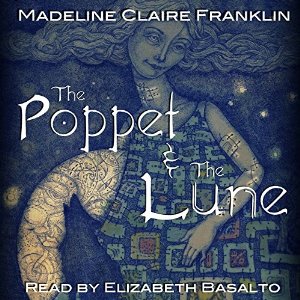 The Poppet and the Lune (2011) by Madeleine Claire Franklin is a novel in the style of a fairy tale, with fantastic elements like witches, werewolves, spells, and a girl created from dead body parts.
The Poppet and the Lune (2011) by Madeleine Claire Franklin is a novel in the style of a fairy tale, with fantastic elements like witches, werewolves, spells, and a girl created from dead body parts.Full disclosure, I got this book in audio form as a complementary review copy. About a year ago the narrator Elizabeth Basalto's sister was handing out audiobook review credits on the
Overall impression: the story was pleasant enough and the narration was okay. There are a lot of fantastic elements, as mentioned above, and there were genuinely clever and moving moments. However, I don't think the story followed through on what should have been its emotional core, and there were some Unfortunate Implications as a result. I will go into more detail on the story below, and there will be spoilers.
As for the narration,
 ( In which I demonstrate why you shouldn't give me complementary copies )
( In which I demonstrate why you shouldn't give me complementary copies )In the end The Poppet and the Lune, despite clever uses of fairy tale elements and entertaining plot developments, undermined its own power by hollowing out what it held out to be its own emotional core. It is many things, fun, colorful, romantic, action-packed, and is also, ultimately, forgettable.

 To left: A more honest cover, brought to you by terrible photoshopping.
To left: A more honest cover, brought to you by terrible photoshopping.
 People Who Eat Darkness: The True Story of a Young Woman Who Vanished from the Streets of Tokyo--and the Evil That Swallowed Her Up is an account of the 2000 murder of 21-year-old British national Lucie Blackman, who had been working as a hostess in the Roppongi area of Tokyo when she disappeared. I got this one on audiobook, on a two-for-one sale I believe, and figured a true-crime book would be a respite from my mega-depressing listen at the time, Douglas A. Blackmon's Slavery by Another Name. Not by much, as it turned out.
People Who Eat Darkness: The True Story of a Young Woman Who Vanished from the Streets of Tokyo--and the Evil That Swallowed Her Up is an account of the 2000 murder of 21-year-old British national Lucie Blackman, who had been working as a hostess in the Roppongi area of Tokyo when she disappeared. I got this one on audiobook, on a two-for-one sale I believe, and figured a true-crime book would be a respite from my mega-depressing listen at the time, Douglas A. Blackmon's Slavery by Another Name. Not by much, as it turned out.

